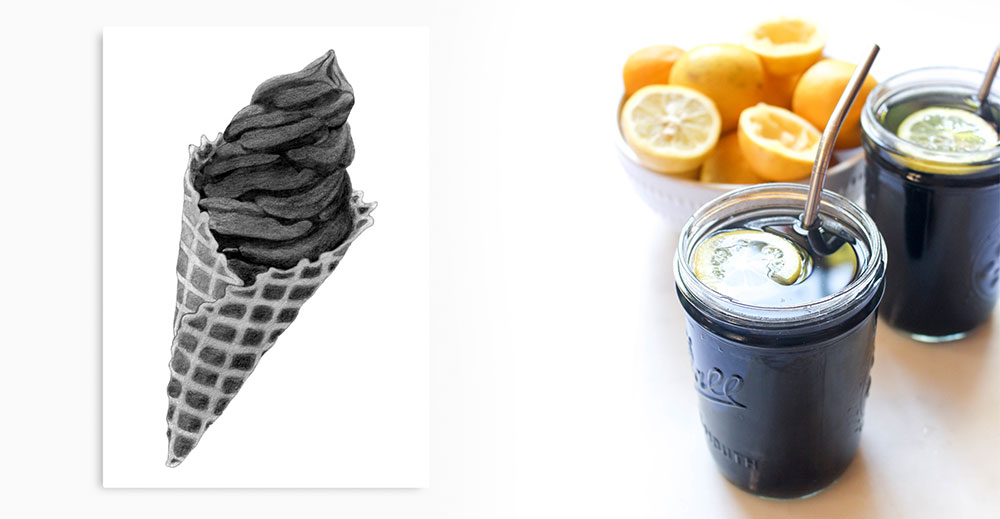Salt therapy – All you need to know
- 24 Feb - 01 Mar, 2024
In the past couple of years since the charcoal face peel surfaced, it seems to have penetrated all territories and is leaving its carbon footprint about everywhere. Now, you can buy an activated charcoal tooth-whitening toothpaste, face washes, pills and powder for health purposes as well as food items that have an enigmatic vibe and Instagram too well. Since it’s all the health and skin care trend rage these days, here are reasons you should try it for and a few you can skip it for.

Miss: Detox drinks
Without a doubt, the detox ingredient of the moment is charcoal, You’ll find it sold as activated charcoal lemonade, in fresh concoctions at juice bars and multitude of other places. We say, skip it. activated charcoal can bind to vitamins and nutrients – meaning you’ll rob your beverage of some of its nutritional value. More alarmingly, activated charcoal binds to medications, rendering them ineffective.
Miss: Foods
Many restaurants are incorporating activated charcoal in their foods, ice creams, burgers with charcoals infused buns and less appetizing-sounding charcoal waffles. Charcoal is liable to irritate the stomach and anyway, it tastes bland; the only up-side is it looks curious. We vote, skip.
Maybe: Teeth-whitening
There’s nothing new about charcoal being used to clean teeth. In fact, charcoal powder is many parts of the world. What is new, however, is the influx of activated charcoal toothpastes claiming to whiten teeth naturally when there’s actually little research to back it up. After practical analysis, it does come to surface that it helps with coffee and tea stains on the teeth, however, experts advise against using it on a daily basis.

Hit: Charcoal masks
Couple of years ago, all our social media feeds were flooded with either praise-flying or hilarious reviews of people trying the black, charcoal mask. According to an expert, "adsorption basically acts like a magnet for dirt, oil, and other impurities – but it depends on physical contact so it needs to sit on the skin to be effective." Others are less confidents about its toxin-removing abilities, especially considering the toxins on the face are slick in oil and oil doesn’t bind with charcoal. We still say try it!
Hit: Charcoal water purifier
Let’s just sat: you should have one. arbon filters such as those in Brita filters – possibly the most ubiquitous form of activated charcoal out there – remove most contaminants and odors in water, such as pesticides and chlorine, and reduce heavy metals like lead. But activated charcoal can also be used in its unprocessed form to purify water: just drop an entire stick into a pitcher or your water bottle. Each stick purifies water for four months – and after that, you can put it in your refrigerator to deodorize the air.
Hit: Charcoal air purifier
Activated charcoal is proven to clear out odors and toxins from the air. Consider getting an activated charcoal air filter for neutralising the stinkiest parts of your home, be it your garbage, fridge, or bathroom, or for when you’re repainting a room.
Maybe: Charcoal pills for poisoning
Thanks to its super-powerful ability to absorb toxins, activated charcoal is proven to be an effective remedy in many (though not all) types of poisonings. However, we still recommend (strictly) that you get a doctor to sign on this. Activated charcoal pills can also be used to treat stomach pain caused by excess gas, diarrhea, or indigestion. Cheap and available over the counter, the pills are great if you’re traveling and happen to get food poisoning. Be sure to look for activated charcoal pills free of sorbitol, which is a laxative.
Unlike regular charcoal, which is a known carcinogen, activated charcoal is medicinal. It’s the byproduct of slowly burnt wood, peat, or coconut shells that is treated with oxygen, a process which renders it highly porous and nonpolar, allowing it to bind with hydrophobic toxins and odors from gases or liquids up to 1,000 times its weight. Activated charcoal comes in many forms: powder and pills for ingesting, granules and cubes for purifying the environment, and sponges and fabrics for cleansing and wearing. Just be sure, that you are using charcoal that is made using a sustainable source, like coconut shells or identified wood species. Binchotan, made purely from Japanese Ubame oak, is the crème de la crème.
• Activated charcoal powder is dangerous to inhale – it can result in a condition like black lung.
• It is most important to remember to store it in a sealed container. Your activated charcoal can start to absorb impurities in the air.
• In case you are using any other charcoal-infused product, make sure there aren’t any other artificial sweeteners or fillers added.
• It’s important to monitor the use of activated charcoal – and not regularly consume it – because it can deplete you of important nutrients. For example, don’t expect to reap the health benefits of vitamins or supplements if you consume them while sipping on a charcoal lemonade drink or after throwing back an activated charcoal pill. Essential nutrients like vitamin C and B vitamins and even prescription medications can be wiped out and pushed out of the body before you have the chance to absorb and process them.
COMMENTS